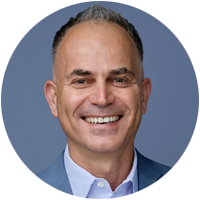Alen Voskanian, MD | Effective Writing for Health Care

Alen Voskanian, MD, chief operating officer and vice president at Cedars-Sinai Medical Network, was quarantining at home during the pandemic when he began to research writing classes for medical professionals. “I’d always wanted to write for the public using my medical knowledge,” he explains, particularly leveraging his background in palliative and end-of-life care. “English is my second language, so I wanted to gain skills for writing that would allow me to be a voice and communicate some of these beautiful lessons that I had learned.” He also harbored dreams of creative writing and was finding it to be a useful therapeutic tool amid the pandemic and the recent loss of a family member.
Voskanian’s formal education prior to this had primarily focused—necessarily—on various medical subjects, but he had always had a latent interest in writing that he was finally intent on pursuing. The Harvard Medical School Effective Writing for Health Care certificate program, which is designed to advance one’s writing and career goals, caught his eye. After speaking with participants who loved the course, he decided to enroll.
From Learning Writing Basics to Drafting a Book
Voskanian chose the Writing for the Public track, which focuses on fostering the skills necessary to communicate science and health care writing in various forms of public-facing media. He completed the course between June 2021 and June 2022 and (while he wasn’t able to attend in person) says he developed a strong bond with professors and participants alike.
“Having the opportunity to hear and learn from so many experts who had similar paths, including physicians, journalists, and creative writers, helped alleviate my worry that writing is this unattainable thing,” he says. The program helped build his confidence—particularly since he also wanted to get stronger in the basics of English writing. “I now know the craft of writing. I know the resources. I don’t know everything, but I know where I can go and get help.”
His capstone project focused on the subject of physician burnout: “It’s a subject very near and dear to my heart—and a big health crisis,” he explains. Voskanian had data that he could use to support his initial thoughts on the subject and submitted a first draft as part of his formal coursework.
“I received great feedback in terms of the way I organized the data,” he recalls. He maintains that the commentary on his work throughout the program—both when it was positive and when it was designed to help him improve—was exceptional, from both his peers and the faculty. The feedback also helped give him the idea to continue pursuing the project. “I thought, Let me write a book about this. The capstone became an exercise tool to see what it takes to write a book.” Toward the end of the program, he began interviewing subject-matter experts and fleshing out the details for this larger project.
Publishing, Creative Writing, and Beyond
Voskanian’s first book, entitled Reclaiming the Joy of Medicine: Finding Purpose, Fulfillment, and Happiness in Today’s Medical Industry (October 2022), offers an in-depth look at the problem of burnout in the medical industry and potential solutions that individual contributors, leaders and the industry as a whole can implement to alleviate the problem. His modified capstone project ended up being a chapter in his book, so his work with the Effective Writing for Health Care program was helpful to his literary output in both a literal and a figurative way.
The program has also been useful in a macroscopic sense. “I’ve learned that being in the classroom is such a joy,” he says. In particular, some of his coursework focused on creative writing that allowed him to create ekphrastic poems (i.e., looking at a work of art or photo and writing about it through poetry). Through these exercises, he explored his creative voice and got helpful feedback from classmates, sparking another of his passions.
Now, Voskanian is focused on creating a book of poetry and is doing more continuing education in the form of poetry and writing classes. And he hasn’t forgotten about his original goal—he’s currently doing research on the complexities of end of life, with the idea of putting together a palliative care book. He says that this program helped him understand the process of submission (including the rejection that can come with publishing), which makes it easier to pursue authorship today.
It’s also helped him become savvier about the writing process and the day-to-day work that goes into longer writing projects. “When I didn’t have the education, I thought there was this mystery: you’re born a writer. Now, I realize it's just as much a learned skill,” he says. “Most people have to sit down every day and write and that’s how you get better.”